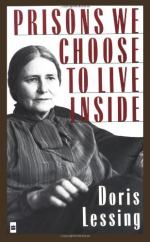
|
| Name: _________________________ | Period: ___________________ |
This test consists of 15 multiple choice questions and 5 short answer questions.
Multiple Choice Questions
1. Lessing believed that anyone studying sects was susceptible to ______________.
(a) Accusing innocent people.
(b) Going crazy.
(c) Believing their doctrine.
(d) Not taking the study seriously.
2. Who turned down Lessing's first book written under a pseudonym?
(a) Lessing's publisher.
(b) Lessing's fans.
(c) Lessing's agent.
(d) None of these.
3. What did Lessing see as a positive, in terms of brainwashing?
(a) It is cheap.
(b) It does not last forever.
(c) It is easy to do.
(d) It is fun.
4. Concerning conformity, Lessing believed that __________had the most influence on an individual.
(a) Friends.
(b) Parents.
(c) The self.
(d) Political parties.
5. How many books did Lessing write under a pseudonym?
(a) One.
(b) Four.
(c) Two.
(d) Five.
6. In what country was the Gettysburg Address made?
(a) The United States.
(b) Cuba.
(c) England.
(d) France.
7. According to Lessing, what type of absolutes do group minds often express?
(a) Historical references.
(b) Scientific data.
(c) Democratic theories.
(d) Sacred assumptions.
8. Lessing believed that any sane person is susceptible to __________.
(a) Consumerism.
(b) Ardent patriotism.
(c) Brainwashing.
(d) Love.
9. What type of laws rule social groups?
(a) None of these.
(b) Public.
(c) Government.
(d) Social.
10. When unprompted confessions took place during the war, what did governments begin to study?
(a) Leaders.
(b) Mental capacity.
(c) Food quality.
(d) Brainwashing.
11. In the United States, people confessed to ridiculous crimes during _____________.
(a) The elections.
(b) The rule of Abe Lincoln.
(c) The witch hunts.
(d) The winter.
12. After the prison experiment, what did the subjects feel?
(a) Forgiveness.
(b) Disappointment.
(c) Surprise.
(d) Fear.
13. What pseudonym did Lessing write under?
(a) April Smalley.
(b) Jessica Walsh.
(c) Jane Doe.
(d) Jane Somers.
14. According to Lessing, what are power structures across the globe putting into practice?
(a) Training for the individual.
(b) Taxation without representation.
(c) Group psychology.
(d) Technological advancements.
15. Experiments in mental hospitals have shown sane people mistaken for _______________.
(a) Dangerous criminals.
(b) Corporate staff.
(c) Insane people.
(d) Medical staff.
Short Answer Questions
1. What did Lessing propose that our government should do?
2. What did Lessing believe about those living in democratic societies?
3. Lessing thought _____________ would be angry over her experiment with a pseudonym.
4. For how many years have governments and priesthoods used brainwashing techniques?
5. Lessing refers to examples such as the acceptance of Jean Rhys' work as what type of mentality?
|
This section contains 383 words (approx. 2 pages at 300 words per page) |

|




